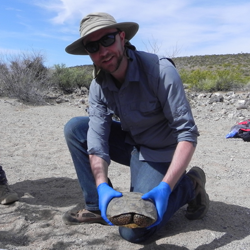Discovery of a New TLR Gene and Gene Expansion Event through Improved Desert Tortoise Genome Assembly with Chromosome-Scale Scaffolds
 Authors:
Authors:
| Greer A Dolby, Matheo Morales, Timothy H Webster, Dale F DeNardo, Melissa A Wilson, Kenro Kusumi |
Abstract:
Toll-like receptors (TLRs) are a complex family of innate immune genes that are well characterized in mammals and birds but less well understood in nonavian sauropsids (reptiles). The advent of highly contiguous draft genomes of nonmodel organisms enables study of such gene families through analysis of synteny and sequence identity. Here, we analyze TLR genes from the genomes of 22 tetrapod species. Findings reveal a TLR8 gene expansion in crocodilians and turtles (TLR8B), and a second duplication (TLR8C) specifically within turtles, followed by pseudogenization of that gene in the nonfreshwater species (desert tortoise and green sea turtle). Additionally, the Mojave desert tortoise (Gopherus agassizii) has a stop codon in TLR8B (TLR8-1) that is polymorphic among conspecifics. Revised orthology further reveals a new TLR homolog, TLR21-like, which is exclusive to lizards, snakes, turtles, and crocodilians. These analyses were made possible by a new draft genome assembly of the desert tortoise (gopAga2.0), which used chromatin-based assembly to yield draft chromosomal scaffolds (L50 = 26 scaffolds, N50 = 28.36 Mb, longest scaffold = 107 Mb) and an enhanced de novo genome annotation with 25,469 genes. Our three-step approach to orthology curation and comparative analysis of TLR genes shows what new insights are possible using genome assemblies with chromosome-scale scaffolds that permit integration of synteny conservation data.
This publication can be viewed here
